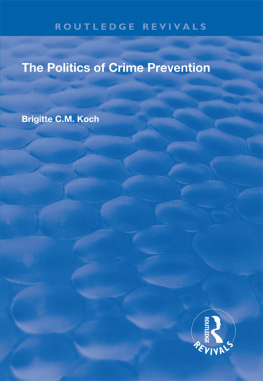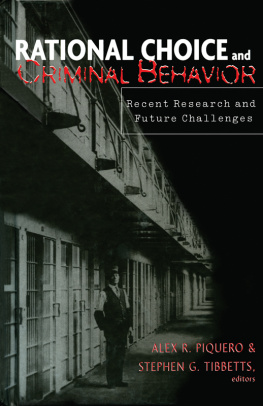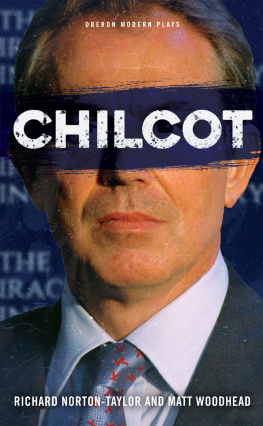Hurray! This is the book my students and I have been awaiting: a systematic, rational discussion of the problems, advantages and future directions of offender choice perspectives. Danielle Reynald and Benoit Leclerc have produced an essential book probing the foundations of scientific and practical crime prevention. Only irrational criminologists will ignore it.
- John E. Eck,Professor of Criminal Justice, University of Cincinnati, USA
The idea that offending involves rational decision-making has been extremely important in criminology and has had significant practical implications for situational crime prevention. This book presents many insightful findings on these topics, including the influence of emotional factors as well as the subjective costs and benefits of offending, and the importance of interactions between types of people and types of situations. It should be of great interest to all criminologists, especially in advancing the understanding of offender decision-making and its implications for crime prevention.
- David P. Farrington,Emeritus Professor of Psychological Criminology, University of Cambridge, UK
A closer look at Jeremy Benthams original work shows that he had a very nuanced and diversified view of what pleasures and punishments people consider when they make decisions. Bentham was not fortunate enough to have the data or the accumulated research now available. In the current volume the contributors apply more modern knowledge to evaluate how offenders make choices, the nuances affecting their choices and how this extra information helps us design lower crime rates.
- Marcus Felson,Professor in the School of Criminal Justice, Texas State University, USA
The Future of Rational Choice for Crime Prevention
The rational choice perspective (RCP) is currently the core theoretical approach underpinning situational crime prevention (SCP). To date, many crimes have been studied through the lens of RCP, and this has increased our understanding of these phenomena, how they are committed and how they could potentially be prevented through SCP. This book, designed with the hope of moving RCP forward for SCP purposes, takes a challenging but novel step in providing leading experts from different disciplines with the opportunity to express themselves on how we could best achieve this task.
This book explores various perspectives, which include the development of frameworks based on the role of situations in crime or forensic sciences for improving crime prevention practices. The need to consider affective states and other offender-related factors to improve our understanding of offender decision-making models is highlighted as a means to better predict which SCP mechanisms may be most useful in dis -couraging particular types of offenders. Finally, it is also argued that the use of RCP should be more pragmatic and that this perspective should be preserved and adapted based on what we find in our experiments.
Taken together, these theoretically distinctive and challenging contributions ultimately guide how crime prevention practices could be best approached in the future.
Danielle M. Reynald is a criminologist at the Griffith Criminology Institute and senior lecturer at the School of Criminology and Criminal Justice at Griffith University, Brisbane, Australia.
Benoit Leclerc is a researcher at the Griffith Criminology Institute and associate professor of criminology and criminal justice at Griffith University, Brisbane, Australia.
Criminology at the Edge
Edited by
Benoit Leclerc
Ross Homel
Clifford Shearing
Griffith University, Australia
www.routledge.com/Criminology-at-the-Edge/book-series/CATE
Over the last few decades, criminology has become known for its rigorous research methods and innovative analyses as well as for the development and testing of traditional and new theories. Criminology, as a science, has become known for its empirical-based theorising and its dedication to enable this knowledge to contribute effectively to realising the goal of creating safe and just societies. This interdisciplinary series explores innovative developments and imagined futures within criminology.
The objective of this series is to expand the boundaries of criminology and facilitate, encourage and disseminate the fruits of a thorough and meticulous discussion of the most important emerging trends within criminology. Innovative criminologists will be encouraged to take risks as they imagine a criminology for the twenty-first century and to think outside existing criminological boxes.
1 The Future of Rational Choice for Crime Prevention
Edited by Danielle M. Reynald and Benoit Leclerc
2 Criminology and the Anthropocene
Edited by Cameron Holley and Clifford Shearing
First published 2018
by Routledge
2 Park Square, Milton Park, Abingdon, Oxon OX14 4RN
and by Routledge
711 Third Avenue, New York, NY 10017
Routledge is an imprint of the Taylor & Francis Group, an informa business
2018 selection and editorial matter, Danielle M. Reynald and Benoit Leclerc; individual chapters, the contributors
The right of Danielle M. Reynald and Benoit Leclerc to be identified as the authors of the editorial material, and of the authors for their individual chapters, has been asserted in accordance with sections 77 and 78 of the Copyright, Designs and Patents Act 1988.
All rights reserved. No part of this book may be reprinted or reproduced or utilised in any form or by any electronic, mechanical, or other means, now known or hereafter invented, including photocopying and recording, or in any information storage or retrieval system, without permission in writing from the publishers.
Trademark notice: Product or corporate names may be trademarks or registered trademarks, and are used only for identification and explanation without intent to infringe.
British Library Cataloguing in Publication Data
A catalogue record for this book is available from the British Library
Library of Congress Cataloging in Publication Data
Names: Reynald, Danielle M., editor. | LeClerc, Benoit, editor.
Title: The future of rational choice for crime prevention / edited
by Danielle M. Reynald and Benoit Leclerc.
Description: 1 Edition. | New York : Routledge, 2018. |
Series: Criminology at the edge; 1 | Includes bibliographical
references and index.
Identifiers: LCCN 2017020771| ISBN 9781138217225 (hardback) | ISBN 9781315441207 (ebook)
Subjects: LCSH: Crime prevention. | Criminal psychology. | Decision making.
Classification: LCC HV7431 .F88 2018 | DDC 364.401/9dc23 LC record available at https://lccn.loc.gov/2017020771
ISBN: 978-1-138-21722-5 (hbk)
ISBN: 978-1-315-44120-7 (ebk)
Typeset in Gill Sans
by Florence Production Ltd, Stoodleigh, Devon, UK











